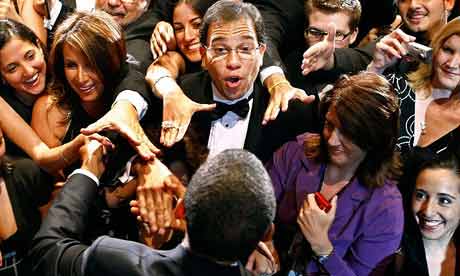From the Gardian Newpaper (UK):
Latinos need more than lip service
Families are being torn apart by America's broken immigration system. President Obama needs to show leadership and fix it

Barack Obama greets supporters at the Congressional Hispanic Caucus Institute's gala. Photograph: Chip Somodevilla/Getty
I'm not talking the first 100 days here, but sometime during his first term, Obama should revive interest in comprehensive immigration reform.
(Get to work on immigration, 7 November 2008)
When Barack Obama won two-thirds of the Latino vote a year ago, he did so without making immigration reform a major part of his election campaign. At a time when the economy teetered on the verge of disaster, it seemed enough to know that he favoured a pathway to citizenship to bring the 12 million undocumented immigrants in the country "out of the shadows" and endorsed a guest worker programme. Like the rest of the nation, we focused on other issues – and then we voted for him in bigger numbers than the general population.
But because so many of our friends, family members and neighbours are affected, the long-delayed overhaul of the dysfunctional immigration system is never far from our minds. So when, earlier this year, Obama said that the issue would dominate his fall schedule, Latino groups nationwide rejoiced. The broken system that carried out inefficient and sometimes cruel workplace and neighbourhood raids, that kept an administrative backlog the size of Delaware and that tore families apart would at last get the attention it has desperately needed for years.
But ever since August, when Obama, in the midst of economic woes and a healthcare war still going on, announced that he was pushing immigration reform back to 2010, it has seemed like a distant dream – especially because next year's midterm elections in Congress promise to be brutal.
The question hangs ominously in the air: Why would a president whose approval ratings have recently slipped and whose party must face comeback-hungry Republicans in a battle to hold House and Senate seats, and who has already taken one divisive, Sisyphean task – healthcare reform – take on another?
Quite simply, because it's the right thing to do. As I wrote in my post-election column a year ago, it makes economic sense, something we could certainly use right now. But let me add one more reason – a humanitarian one.
I recently interviewed families who had been forced apart because of immigration issues. In one case, an undocumented mother who had been brought to the US as a baby was denied legal residency – though her parents had been granted it – because of a technicality that she appealed four times. One month before she was to graduate nursing school, Cristina Ramirez was picked up at her southern California home at 8am and dropped off with nothing but her cell phone in Tijuana, Mexico at 2.30pm. She spent the next 18 months living in the dangerous city while negotiating the labyrinthine immigration system to get back to her four kids and US citizen husband.
In another case, I spoke to a father of two whose undocumented wife had been deported but who had chosen to go into hiding rather than return to Nicaragua on his own deportation order. As US-born citizens, his kids were entitled to stay. But because of his illegal status, they would virtually be forced to leave with him or be left behind with relatives if he honoured the order.
Ronald Soza – who had fled Nicaragua's political turmoil and tried unsuccessfully to get legal status through a special law favouring political prisoners from that country – was in tears as he recalled the heart-wrenching decision to remain with the kids rather than have the three join his wife. "This is their country. They are both intelligent and great students and here, they can finish their education and be somebody," he said, in tears. "In Nicaragua they'd simply have no future."
In many cases like Soza's, the parents bear great responsibility for putting themselves and their kids in a questionable situation. But so should the US, which has never come to terms with the fact that its demand for cheap labour makes dangerous, illegal border crossings attractive and its immigration system has never successfully dealt with foreign workers. Obama has the opportunity to change that now. He should take it.
 Barack Obama greets supporters at the Congressional Hispanic Caucus Institute's gala. Photograph: Chip Somodevilla/Getty
Barack Obama greets supporters at the Congressional Hispanic Caucus Institute's gala. Photograph: Chip Somodevilla/Getty
No comments:
Post a Comment